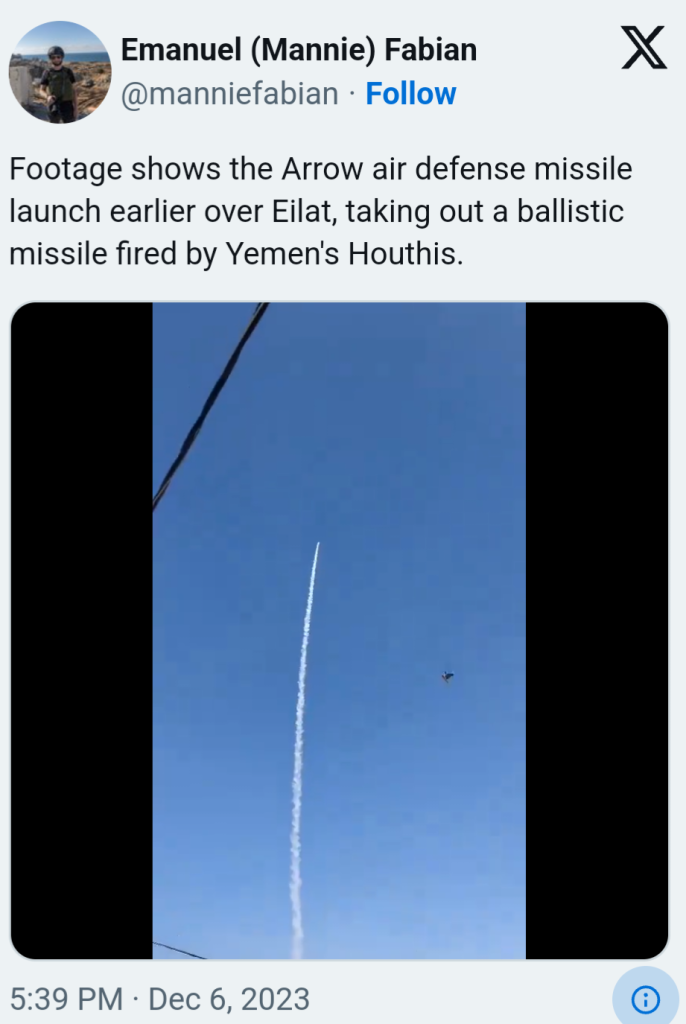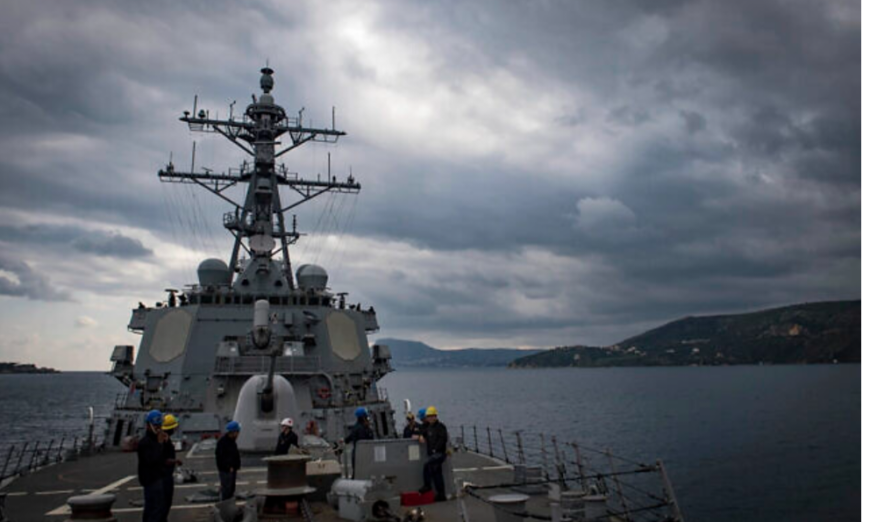This November 12, 2018 photo shows the USS Carney in the Mediterranean Sea. (Mass Communication Specialist 1st Class Ryan U. Kledzik/US Navy.)
Washington reportedly worried Israeli action against Iran-backed Yemeni rebels could ignite broader conflict amid ongoing war against Hamas.
The Biden administration has urged Israel not to respond to recent attacks by Yemen’s Houthis, including several missile and drone assaults, the Wall Street Journal reported Thursday.
The report cited unnamed officials from the US and other governments as saying Washington is concerned that an Israeli response could ignite a wider conflict in a region that is already on edge amid the Israel-Hamas war.
Rather, Washington wants Israel to let the US military handle the response to the Houthis, who have also attacked shipping in the Red Sea.
At the same time, the US is also apparently reluctant to hit the Iran-backed Houthis.
The rebel group has fired several ballistic missiles and drones at Eilat since the beginning of the Israel-Hamas war in October, all of which were intercepted or missed their targets. The latest attack came Wednesday when Israel shot down a ballistic missile over the Red Sea.
Houthi rebels have expressed support for Palestinians and threatened Israel over its war in Gaza, which erupted after Hamas carried out a devastating attack on Israel on October 7, killing over 1,200 people, mostly civilians., and abducting 240. Israel has vowed to topple the Hamas regime in Gaza and release the hostages.

When Houthi rebels in Yemen launched missiles and hit three commercial ships in the southern Red Sea last weekend, it raised the question of whether the US military will strike back.
The Houthis have sharply escalated their attacks against ships as they sail toward the narrow Bab el-Mandeb Strait. The Houthis have claimed these ships are Israeli targets. All ships targeted have not been Israeli or headed to or from Israel, but had some links to Israeli businessmen.
US Navy ships have shot down an array of drones headed their way and believed to have been launched by the terror group from territory it controls in Yemen.
But so far, the US has avoided military retaliation — a marked difference from its multiple strikes against Iran-backed militias in Iraq and Syria that have fired rockets, missiles, and drones at bases housing American forces in both countries.
No one has been reported hurt in the Houthi incidents, although the commercial ships suffered some damage.
After the weekend attacks, Houthi military spokesman Brig. Gen. Yahya Saree said the group wants to “prevent Israeli ships from navigating the Red Sea (and Gulf of Aden) until the Israeli aggression against our steadfast brothers in the Gaza Strip stops.”
One of the commercial ships hit on Sunday — the Unity Explorer — has a tenuous Israeli link. It is owned by a British firm that includes Dan David Ungar, who lives in Israel, as one of its officers. Israeli media identified Ungar as being the son of Israeli shipping billionaire Abraham “Rami” Ungar.
Sunday’s flurry of attacks included missiles that hit the Unity Explorer, the Number 9, and the Sophie II, all bulk carriers. And throughout that day, the USS Carney, a Navy destroyer, shot down three drones that were headed toward the ship and also went to the aid of the commercial vessels. On Wednesday, the USS Mason shot down a drone heading in its direction.
In a statement, US Central Command said, “We cannot assess at this time whether the Carney was a target” of the drones.
Houthi rebels swept down from their northern stronghold in Yemen and seized the capital, Sanaa, in 2014, launching a grinding war. A Saudi-led coalition intervened in 2015 to try to restore Yemen’s exiled, internationally recognized government to power.
The group is part of the axis of resistance” against Israel along with Hamas — which is also sponsored by Tehran.
The apparent American reluctance to hit the Houthis reflects political sensitivities and stems largely from broader Biden administration concerns about upending a shaky truce in Yemen and triggering a wider conflict in the region.
US officials warn that military action is an option and they haven’t taken it off the table. But both publicly and privately, officials stress that there is a difference between the Iraq and Syria bombings and the Houthi attacks.
At the same time, the US has consistently said it wants to protect free navigation of the seas. However, the Houthi actions have prompted the International Maritime Security Construct to issue a warning for ships transiting the Red Sea and Bab el-Mandeb. It says ships should choose routes as far from Yemeni waters as possible, travel at night, and not stop because that makes them an easier target.
This week the US said it was talking with allies about using a naval task force to escort commercial ships in the Red Sea. About 38 countries participate in a similar task force in the region — largely to battle piracy off the coast of Somalia. Officials have to discuss the issue with allies to see who wants to be involved in a new effort.
The Biden administration has talked persistently about the need to avoid escalating the Israel-Hamas war into a broader regional conflict. So far, strikes on the Iranian-backed groups in Iraq and Syria have not broadened the conflict, said Maj. Gen. Pat Ryder, Pentagon press secretary.
It’s not clear if targeted strikes against Houthi weapons depots or similar sites — which also have Iranian support — would cross a line and trigger a wider war.
“We will continue to consult with international allies and partners on an appropriate way to protect commercial shipping going through that region, and at the same time ensuring we do what we need to do to protect our forces,” said Ryder.
Meanwhile, Saudi Arabia has urged the United States to show restraint in responding to continued attacks on vessels in the Red Sea by the Houthis, Reuters reported Wednesday.
Two sources familiar with Riyadh’s messaging said the kingdom is also seeking to limit spillover from Israel’s war against Hamas.
IDF says its jets struck Hezbollah sites in southern Lebanon in response to repeated attacks.
3-year-old Cunio twins, mother discharged from hospital 10 days after release from Hamas captivity.
War cabinet minister, ex-IDF chief Gadi Eisenkot’s son killed in Gaza, along with 2nd soldier.
IDF says Hamas firing rockets from Gaza safe zones as civilian scramble for shelter.
Following US pressure, Israel approves increase of fuel deliveries to Gaza.
Israeli civilian killed by anti-tank missile in north as Hezbollah attacks continue.
Gallant; Residents of northern border towns won’t return before Hezbollah pushed away.
Doctor finds freed hostages were sexually abused in Gaza.

